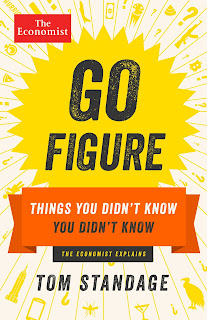So, let me try to be measured here. Tom Standage is credited as the author of Go Figure, a collection of explainer articles that originally appeared separately in The Economist in the handful of years leading up to 2016. Standage was Deputy Editor of The Economist for that period; he was responsible for this department. However, it says in this book that he did not write all of these articles - there was a team who did this regularly, possibly including researchers on top of actual writers - and it's not entirely clear if he wrote any of the pieces from a blank page, or if he was primarily the editor.
If the book said "edited" or "compiled" by Standage, or by Standage "with" or "and" some way of defining that team, that would be fine; it would be clear and descriptive. What annoys me is one person standing up and taking credit for something I'm pretty sure was a group effort.
Of course I could be wrong: maybe I misunderstood. Maybe Standage did write all of these articles from scratch, however often they appeared, for several years, and then compiled them into the book in 2016. If so, it's entirely reasonable to only list him on the cover.
But I'm pretty sure that's not how it happened.
The book itself is slightly out of date at this point: journalism dates quicker than most non-fiction, though explainers are more shelf-stable than breaking news. But it's all, as far as I can tell, still accurate - there may be more details about many of these areas, but I didn't see anything that was superseded.
It's organized into a number of rough categories, which are fairly vague: the first two sections are "things you didn't know you didn't know" and "things you've quietly always wondered." It gets a little better-defined from there, which sections on differences between countries, economics and numbers, leisure and sport, newish tech (mostly Internet-related), and science. Each section has around fifteen articles; each article is about two book pages - Standage says in his afterword that the format is to write in four paragraphs, and I bet there was a target word-count, too. (Which he does not mention.)
It is from The Economist, so it has their biases deeply embedded in it: capitalism is the greatest good of all time, everywhere in the world, and economic analysis will always provide the correct answer, no matter what that means for actual human beings or what insight other kinds of expertise might bring to a situation. A reader can get a lot of interesting data and ideas from the book, as long as that very clear bias is kept in mind.

No comments:
Post a Comment